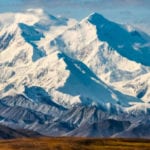 History
History  History
History  Health
Health 10 Everyday Activities That Secretly Alter Consciousness
 History
History Top 10 Historical Disasters Caused by Someone Calling in Sick
 Animals
Animals 10 New Shark Secrets That Recently Dropped
 Movies and TV
Movies and TV 10 Forgotten Realities of Early Live Television Broadcasts
 Technology
Technology 10 Stopgap Technologies That Became Industry Standards
 Weird Stuff
Weird Stuff 10 Wild Facts About Taxidermy That You Probably Didn’t Know
 Travel
Travel 10 Beautiful Travel Destinations (That Will Kill You)
 Miscellaneous
Miscellaneous 10 Modern Marriage Rituals Born from Corporate Branding
 Weird Stuff
Weird Stuff Ten Bizarre Visions of 2026 from Fiction
 History
History 10 “Modern” Problems with Surprising Historical Analogs
 Health
Health 10 Everyday Activities That Secretly Alter Consciousness
 History
History Top 10 Historical Disasters Caused by Someone Calling in Sick
Who's Behind Listverse?

Jamie Frater
Head Editor
Jamie founded Listverse due to an insatiable desire to share fascinating, obscure, and bizarre facts. He has been a guest speaker on numerous national radio and television stations and is a five time published author.
More About Us Animals
Animals 10 New Shark Secrets That Recently Dropped
 Movies and TV
Movies and TV 10 Forgotten Realities of Early Live Television Broadcasts
 Technology
Technology 10 Stopgap Technologies That Became Industry Standards
 Weird Stuff
Weird Stuff 10 Wild Facts About Taxidermy That You Probably Didn’t Know
 Travel
Travel 10 Beautiful Travel Destinations (That Will Kill You)
 Miscellaneous
Miscellaneous 10 Modern Marriage Rituals Born from Corporate Branding
 Weird Stuff
Weird Stuff Ten Bizarre Visions of 2026 from Fiction
Top 10 Mind Blowing Facts About Majestic Mountains
The massive, but slow movement of the earth’s crust is what formed mountains and resulted in majestic spires across the globe. Many of the biggest mountain ranges in the world have been formed after gigantic collisions between continents. Mountains have long fascinated humanity, with thousands trying to conquer the highest peaks every year. They are also extremely important for the eco-system and as such the United Nations has declared 11 December to be International Mountain Day in an effort to raise awareness around this topic.
On this list are some fascinating facts about stately mountains you may not know.
Top 10 Fantasy Places That Would Suck In Real Life
10 Beach on Table Mountain
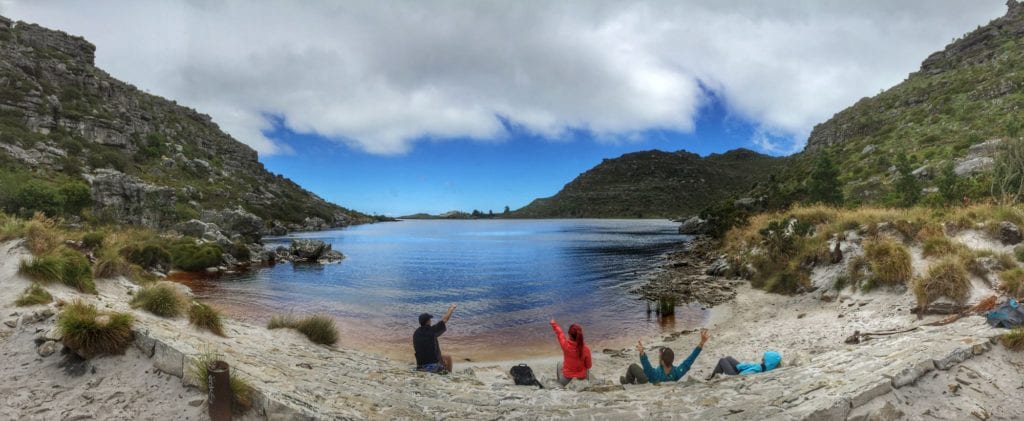
Legend has it that when a thick band of mist or cloud settles over Table Mountain in Cape Town, Jan van Hunks is furiously puffing away at his pipe on nearby Devil’s Peak, trying to out-smoke the devil himself.
Table Mountain, named for its distinctive flat top, is believed to be around 360 million years old and formed after the continents split apart and pressures built up in the earth’s crust. Granite, formed by magma that cooled under the surface, reinforced the mountain, and ice sheets flattened the top.
The mountain sports a world-famous cableway that has transported over 20 million visitors since it opened in October 1929. The construction process was halted by the Anglo-Boer war in 1880 and then again when WWI broke out.
One of the coolest facts about Table Mountain is that you can visit a ‘beach’ at the top. Skeleton Gorge Beach can be reached by hiking through Skeleton Gorge and heading up to the indigenous forest on the east side of the mountain. From there you carry on to a mound of rocks called Maclear’s Beacon, which marks the highest point on the mountain. A five-minute walk will lead you to white sand adjacent to the Hely-Hutchinson dam, which is one of five dams on Table Mountain.[1]
9 Life on Mars
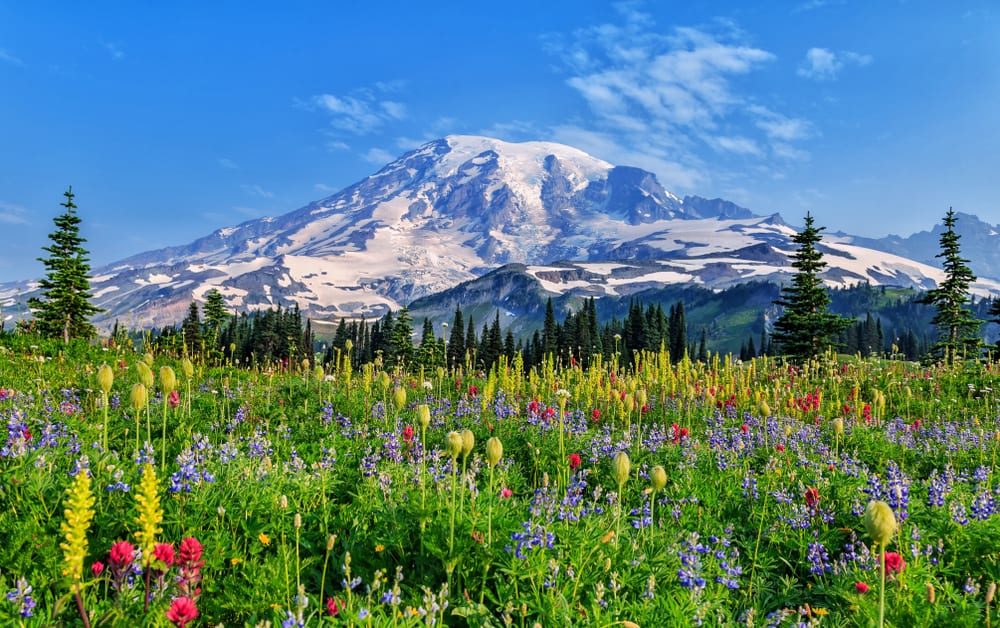
Mount Rainier is believed to potentially be one of the most dangerous volcanoes in the Cascade Range, not only because of its height, but also its persistent earthquakes and substantial glacier mantle. This is despite the fact that it hasn’t produced a destructive eruption in the last 500 years.
The glaciers on Mount Rainier is home to ice worms, which are the only worms in the world that spend their life on ice, from birth to death. They can grow up to an inch in length and feed on snow algae. The fumarole ice caves on this volcanic mountain attracted a team of scientists and volunteers in 2017 who started a search for clues to life on Mars. The goal of their research is to closely study extremophiles (minute organisms) as they hash out an existence feeding off the noxious gases emanating from the ice caves. This would give scientists a better understanding of potential life on other planets. The project was due to end in 2020.[2]
8 Tallest manmade structure in the UK
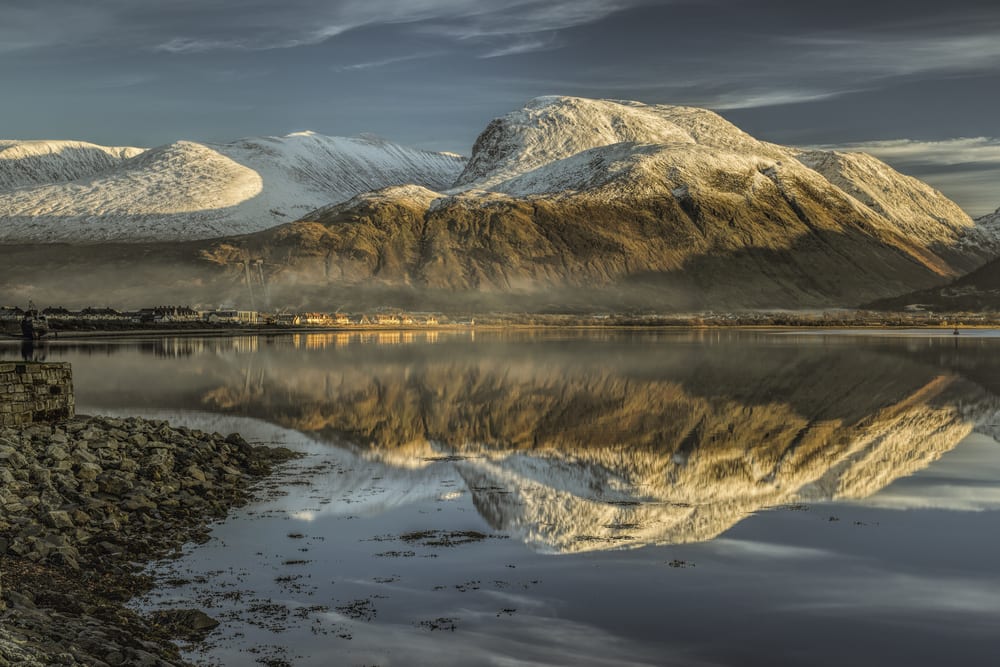
The highest mountain in the British Isles, UK, Great Britain and Scotland draws around 100,000 visitors each year who attempt to conquer its highest peaks. The Ben Nevis summit was formed by the collapsed dome of an ancient volcano and is believed to be around 350 million years old.
Ben Nevis’ true name is Beinn Nibheis which is Gaelic for Venomous or Malicious Mountain. At its summit lies a rugged plateau a hundred acres long which includes a cairn at its highest point and an old observatory which aided in the invention of the cloud chamber. Scientists worked and lived in the observatory for 21 years from 1883 to record weather conditions, taking readings every hour of the day and night.
The roof of the observatory, although dilapidated, stretches above the point of the summit which makes it the tallest manmade structure in the UK. The observatory can also still be used as a form of shelter during emergencies.[3]
7 Home to the Gods
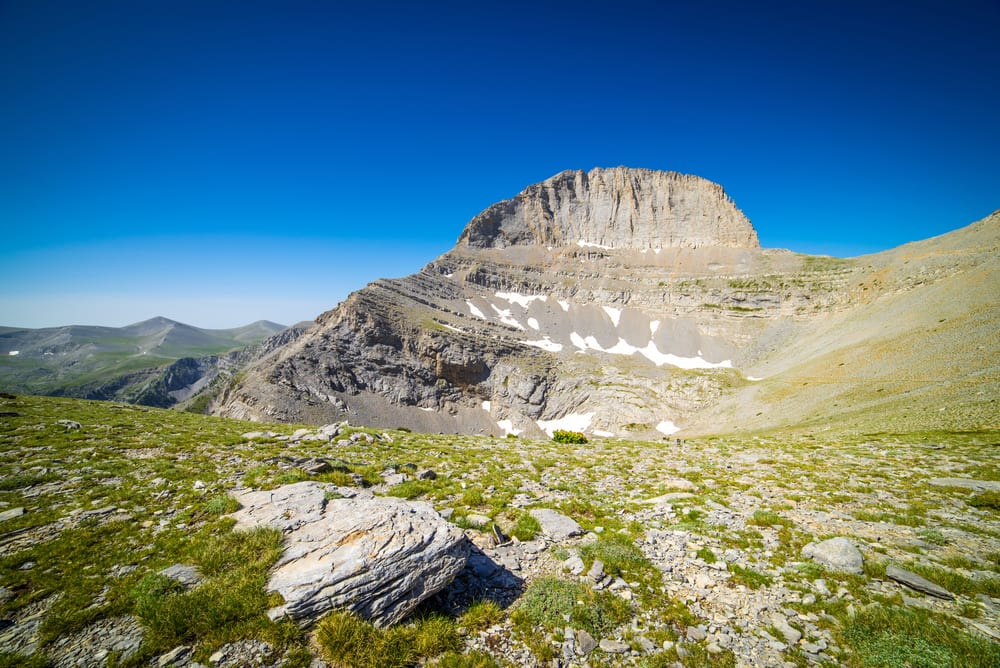
Greek mythology named Mount Olympus as the home of the Olympian Gods, won during the battle between the Olympians and the Titans. Its highest peak was said to have been frequented by Zeus.
Mount Olympus is the highest mountain in Greece and remained unexplored until it was finally conquered by three climbers in 1913. The mountain guide, Christos Kakkalos, who assisted Frédéric Boissonnas and Daniel Baud-Bovy on their expedition, remained the official guide of Olympus until he died in 1976.
The mountain has a delicate eco-system consisting of hundreds of species of both fauna and flora, including 60 types of orchid, cornflowers, lilies and more. On its slopes you will find horned larks, golden eagles, wallcreepers as well as European honey buzzards and the Balkan chamois. Bears travel via the mountain on their way from the north to Pilio and Thessaly and 170 different species of butterflies beautify the scenery even more.[4]
6 Resting place of Noah’s Ark
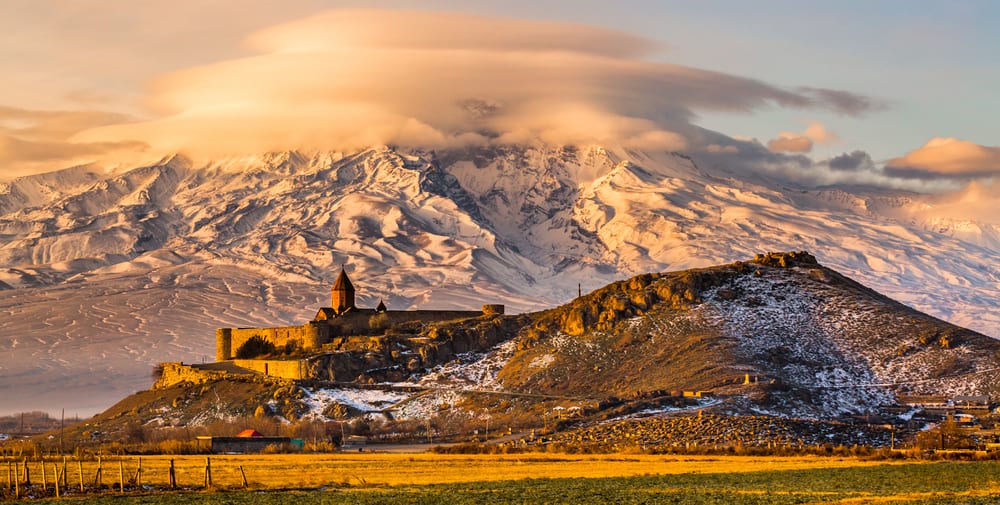
In 1829 the first recorded ascent of Mount Ararat’s summit took place. The mountain consists of two volcanic cones named Great Ararat (highest peak in Turkey) and Little Ararat.
Mount Ararat is considered to be sacred by Armenians and is the country’s principal national symbol, featured in art and literature as well as on its coat of arms with Noah’s Ark perched at its top.
In 2010 a group of Turkish and Chinese explorers claimed that they had discovered Noah’s Ark near the peak of the mountain during their expedition between 2007 and 2008. The group, called Noah’s Ark Ministries, said that they found seven large wooden compartments buried at 4,000 meters above sea level and returned to the site of their discovery in 2009 with a film crew in tow. They went on to say that wood taken from the site and radiocarbon-dated revealed that it was around 4,800 years old which could fit into the time of Noah’s flood as recorded in the Bible.
These claims drew wide-spread criticism and heated debate, with the majority of experts refuting them.[5]
Top 10 Truly Disturbing Facts About Japan’s Suicide Forest
5 Ghostly mountains
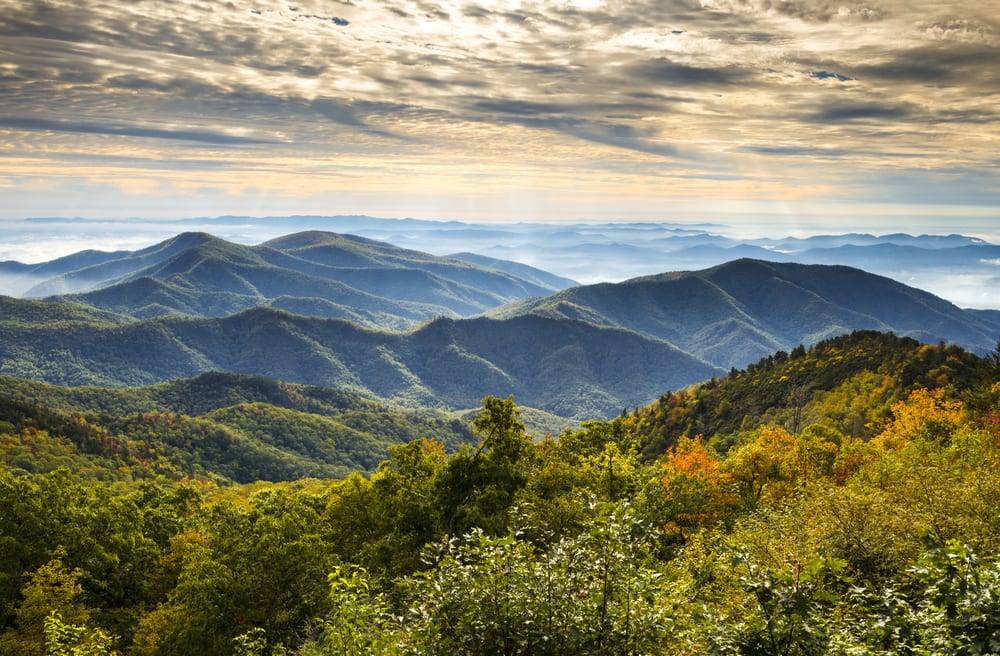
The Appalachian Mountains form a natural barrier between the eastern Coastal Plain and the Interior Lowlands of North America and played a critical role in the settlement of the continent. The Appalachians are world-famous, in no small part due to its massive National Scenic Trail which spans fourteen states. The creator of this fantastic hiking trail is said to have daydreamed about the idea while sitting in a tree on top of Vermont’s Stratton Mountain.
There have been several hikers who attempted to hike the entire trail with most dropping out due to injury, illness or extreme fatigue. In 1955, 67-year-old Emma Gatewood became one of the first people to complete the entire hike. In 2009, hiking the Appalachian Trail became something of a meme for adultery, after it was revealed that South Caroline Governor Mark Sanford was off visiting his mistress in Argentina instead of hiking the trail as claimed by his staff members.
The Appalachians are also as well known for its apparent ‘hauntings’ as it is for the beauty of the hiking trail. There have been scores of reports of disembodied footsteps, voices, whispers, Big Foot encounters and an apparition dressed in formal clothes with ice-blue eyes that vanishes when approached.[6]
4 Hotel at the base of ‘The Ogre’
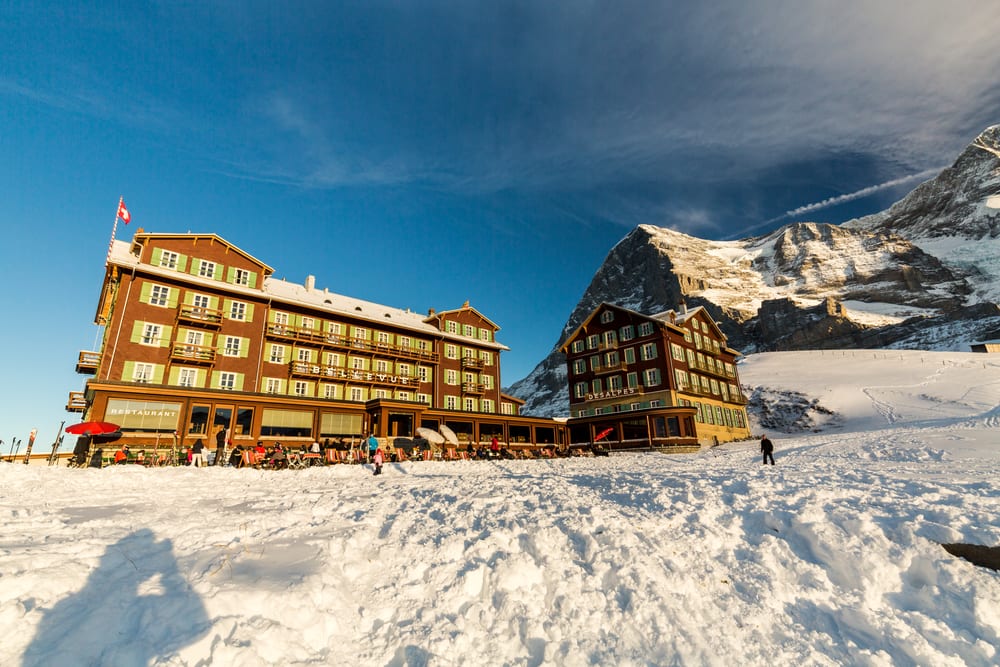
During the 1930s, groups of people would gather at the base of the Eiger in Switzerland to watch climbing parties try and conquer the mountain’s sheer face. Its north face was first climbed by an Austrian-German expedition in 1938 and the mountain, also known as the ‘Ogre’, soon became known for its multiple fatalities. Since 1935 there have been at least 64 deaths on the mountain, all climbers who attempted to reach the top. The north face of the Eiger consists of limestone and ice and is always in shadow. It has also earned itself the nickname, Mordwand, which literally means ‘death wall.’ The Eiger is also known to have its ‘own weather system’ which is very unpredictable.
At the base of the north face of Eiger as well as the adjacent Mönch and Jungfrau, darkened by its massive shadow, sits the Bellevue des Alpes hotel. It is here that the aforementioned groups would gather on balconies and terraces to catch a glimpse of the climbing parties dangling from the side of the mountain. The hotel lies 2070m above Grindelwald and Wengen and is one of the few remaining grand hotels dating to the 19th century.[7]
3 Incredible tribute
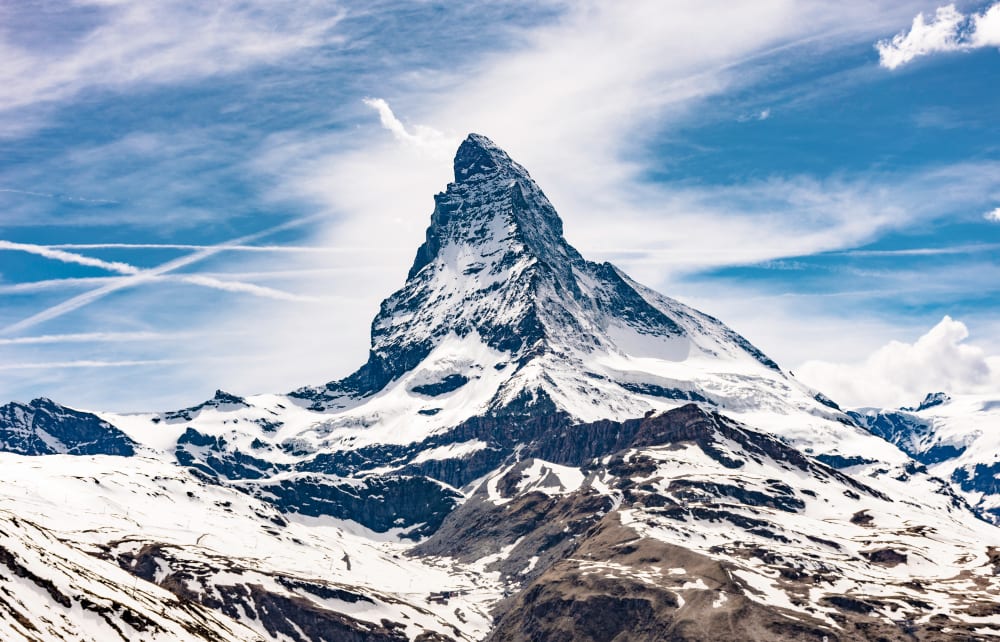
The Matterhorn is one of the most recognizable mountains in the world and straddles the Swiss-Italian border. Its pyramid shape was formed millions of years ago when two landmasses crashed into each other and forced the ground upward. The rock at the top of the mountain has been determined to have come from the African continental plate when it slammed into the European plate. The resulting peak has four sides that align with the cardinal directions: north, south, east, and west.
The mountain claimed its first victims during the first ascent made to the top by a seven-member group of climbers in 1865. Only three made it back to the ground alive. In the years that followed, around 500 more people have died trying to climb the mountain.
In 2015, a group of mountain guides retraced the streps of those who ascended the mountain 150 years prior and placed glowing red lanterns along the mountain’s ridge as they went. The result was a magnificent tribute to the brave souls who lost their lives in the pursuit of the peak.[8]
2 What’s in a name?
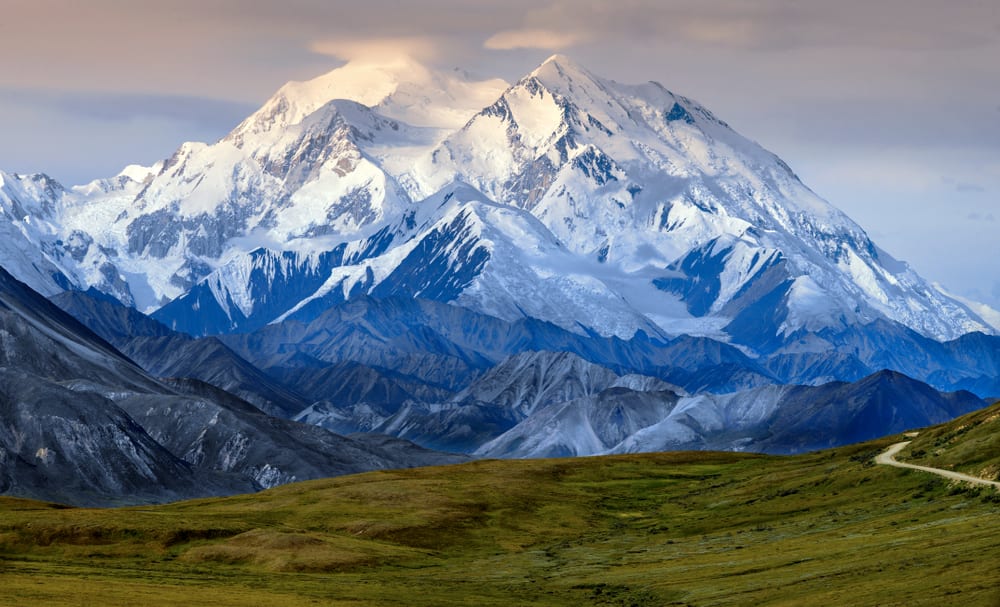
The native Koyukon Athabascan people call the tallest mountain in North America Denali, which means “The Great One.” However, in 1896, a gold prospector by the name of William Dicky named the mountain Mount McKinley after President William McKinley. The park in which the mountain sits was also called Mount McKinley National Park and was established in 1917. In 1975 the name of the mountain was changed to Denali by the State of Alaska, but was blocked by the federal government from doing so officially. Finally, in 2015, under the presidency of Barack Obama, the name Denali was officially restored to the mountain.
Denali is taller than Mount Everest, but both are pretty much dwarfed by Mauna Kea in Hawaii which is 10,204 meters tall when measured from its base on the ocean floor to its summit.[9]
1 Growing mountain
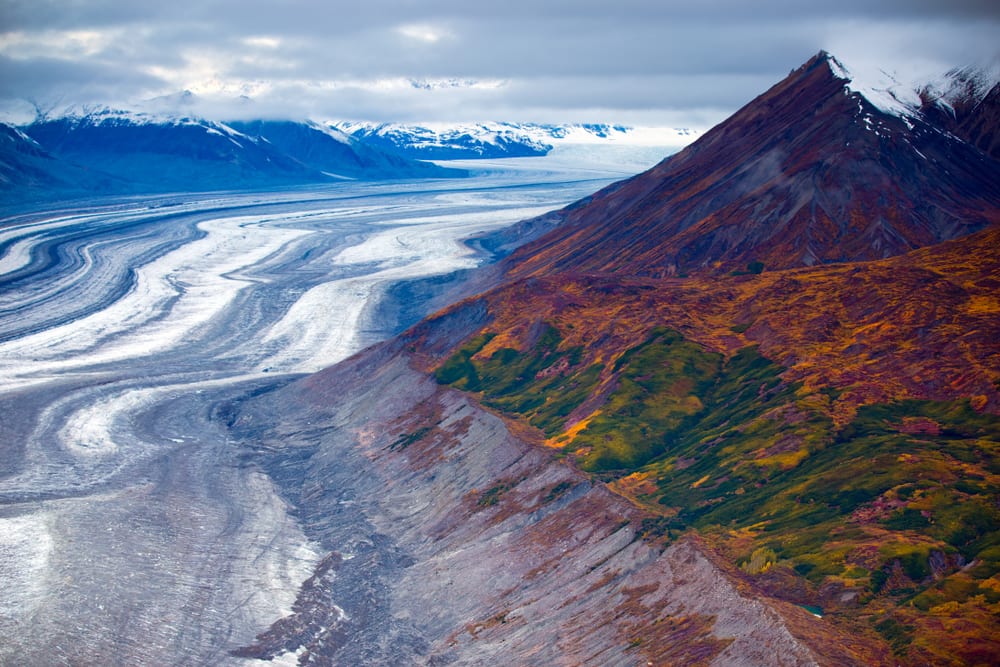
Major changes implemented by Park Canada for 2020 saw the banning of solo expeditions on Mount Logan and any other peaks in the Kluane National Park. Climbing parties are required to take out mandatory insurance and all rescues will be charged.
Mount Logan is the tallest mountain in Canada and the second highest in North America. The mountain has the largest base circumference of any non-volcanic mountain on Earth and its exact height was only determined in 1992 when an expedition of climbers reached the top and used GPS technology to establish it.
However, the mountain isn’t stagnant at its height of 5,959 meters. In fact, it is still rising due to constant tectonic movements pushing the mountain upward. What’s more, the temperature on Mount Logan go extremely low and can fall to -45 degrees Celsius during winter and -27 degrees Celsius during summer.[10]
10 Caves And Mountains Connected To UFO And Alien Activity
